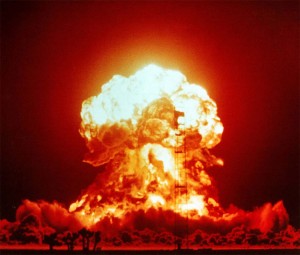The Swaggering Goofiness of the US Empire
The United States and Russia still maintain vast nuclear arsenals of mutual assured destruction, putting the future of humanity in jeopardy every instant. But an unnerving nonchalance has settled over the American side which has become so casual about the risk of cataclysmic war that the West’s propaganda and passions now ignore Russian fears and sensitivities.
A swaggering goofiness has come to dominate how the United States reacts to Russia, with American politicians and journalists dashing off tweets and op-eds, rushing to judgment about the perfidy of Moscow’s leaders, blaming them for almost anything and everything.
These days, playing with nuclear fire is seen as a sign of seriousness and courage. Anyone who urges caution and suggests there might be two sides to the U.S.-Russia story is dismissed as a wimp or a stooge. A what-me-worry “group think” has taken hold across the U.S. ideological spectrum. Fretting about nuclear annihilation is so 1960s.
So, immediately after last Friday night’s murder of Russian opposition figure Boris Nemtsov, the West’s media began insinuating that Russian President Vladimir Putin was somehow responsible even though there was no evidence or logic connecting him to the shooting, just 100 meters from the Kremlin, probably the last place Russian authorities would pick for a hit.
But that didn’t stop the mainstream U.S. news media from casting blame on Putin. For instance, the New York Times published an op-ed by anti-Putin author Martha Gessen saying: “The scariest thing about the murder of Boris Nemtsov is that he himself did not scare anyone,” suggesting that his very irrelevance was part of a sinister political message.
Though no one outside the actual killers seems to know yet why Nemtsov was gunned down, Gessen took the case several steps further explaining how – while Putin probably didn’t finger Nemtsov for death – the Russian president was somehow still responsible. She wrote:
“In all likelihood no one in the Kremlin actually ordered the killing — and this is part of the reason Mr. Nemtsov’s murder marks the beginning of yet another new and frightening period in Russian history. The Kremlin has recently created a loose army of avengers who believe they are acting in the country’s best interests, without receiving any explicit instructions. Despite his lack of political clout, Mr. Nemtsov was a logical first target for this menacing force.”
So, rather than wait for actual evidence to emerge, the Times published Gessen’s conclusions and then let her spin off some even more speculative interpretations. Yet, basing speculation upon speculation is almost always a bad idea, assuming you care about fairness and accuracy.
Remember how after the Oklahoma City bombing in 1995, some terrorism “experts” not only jumped to the false conclusion that the attack was a case of Islamic terrorism but that Oklahoma was chosen to send a message to Americans that no part of the country was safe. But the terrorist turned out to be a white right-wing extremist lashing out at the federal government.
While surely hard-line Russian nationalists, who resented Nemtsov’s support for the U.S.-backed Ukrainian regime in Kiev, should be included on a list of early suspects, there are a number of other possibilities that investigators must also consider, including business enemies, jealous rivals and even adversaries within Russia’s splintered opposition – though that last one has become a target of particular ridicule in the West.
Yet, during my years at the Associated Press, one of my articles was about a CIA “psychological operations” manual which an agency contractor prepared for the Nicaraguan Contra rebels noting the value of assassinating someone on your own side to create a “martyr” for the cause. I’m in no way suggesting that such a motive was in play regarding Nemtsov’s slaying but it’s not as if this idea is entirely preposterous either.
My point is that even in this age of Twitter when everyone wants to broadcast his or her personal speculation about whodunit to every mystery, it would be wise for news organization to resist the temptation. Surely, if parallel circumstances occurred inside the United States, such guess work would be rightly dismissed as “conspiracy theory.”

Leave a Reply